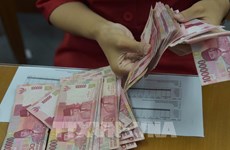Thailand works for early parliament ratification of RCEP
Thailand’s government is speeding up the process to get parliament’s approval of the signing of the Regional Comprehensive Economic Partnership (RCEP) by February 2021 to pave the way for full ratification within 2021, according to Thai Commerce Minister Jurin Laksanawisit.
 The virtual 4th RCEP Summit (Photo: Reuters)
The virtual 4th RCEP Summit (Photo: Reuters)Bangkok (VNA) – Thailand’s government is speeding up the process to get parliament’s approval of the signing of the Regional Comprehensive Economic Partnership (RCEP) by February
2021 to pave the way for full ratification within 2021, according to Thai Commerce
Minister Jurin Laksanawisit.
Seeing the pact as a vital tool for economic recovery and growth, the Thai Ministry of Commerce expects free trade among RCEP members to start by the middle of next year, following almost eight years of talks.
Jurin said the pact may impact some businesses, and they ought to receive assistance to cope with any adjustments, local media reported.
The government will propose the RCEP pact be endorsed as soon as possible during this parliamentary session which takes place from November 2020 to February 2021, he said.
RCEP is a free-trade pact initially proposed for the 10 ASEAN member states, namely Brunei, Vietnam, Laos, Cambodia, Thailand, Myanmar, Malaysia, Singapore, Indonesia and the Philippines; and the bloc's six dialogue partners - China, Japan, the Republic of Korea, India, Australia and New Zealand. Last year India decided against joining RCEP over unresolved issues, especially those concerning agricultural tariffs.
The newly-signed agreement formed the world’s largest trade bloc which has combined Gross Domestic Products (GDP) of 26.2 trillion VND, or about 30 percent of the global GDP, and accounts for 28 percent of the world’s trade. Its members cover a third of the global population, or 2.2 billion people.
For the pact to take effect, it must be ratified by at least six ASEAN members and three non-ASEAN countries among the 15 signatories.
Once the pact is approved by lawmakers, the ASEAN Secretariat will be notified to complete the ratification process.
Jurin expressed his confidence that Thailand will benefit from RCEP. Thailand can export tapioca, rubber, fish and food to the other 14 countries, and there are benefits in terms of investment and service sectors, he said, adding he believes the country will be able to improve upon its current ranking (11th) among the world's leading food exporters.
The commerce minister said the private sector would have 6-12 months to adjust to the pact, which will introduce a range of new issues ranging from trade promotion and investment protection to intellectual property and e-commerce.
The Trade Negotiations Department is considering remedy measures if industries are harmed./.
Seeing the pact as a vital tool for economic recovery and growth, the Thai Ministry of Commerce expects free trade among RCEP members to start by the middle of next year, following almost eight years of talks.
Jurin said the pact may impact some businesses, and they ought to receive assistance to cope with any adjustments, local media reported.
The government will propose the RCEP pact be endorsed as soon as possible during this parliamentary session which takes place from November 2020 to February 2021, he said.
RCEP is a free-trade pact initially proposed for the 10 ASEAN member states, namely Brunei, Vietnam, Laos, Cambodia, Thailand, Myanmar, Malaysia, Singapore, Indonesia and the Philippines; and the bloc's six dialogue partners - China, Japan, the Republic of Korea, India, Australia and New Zealand. Last year India decided against joining RCEP over unresolved issues, especially those concerning agricultural tariffs.
The newly-signed agreement formed the world’s largest trade bloc which has combined Gross Domestic Products (GDP) of 26.2 trillion VND, or about 30 percent of the global GDP, and accounts for 28 percent of the world’s trade. Its members cover a third of the global population, or 2.2 billion people.
For the pact to take effect, it must be ratified by at least six ASEAN members and three non-ASEAN countries among the 15 signatories.
Once the pact is approved by lawmakers, the ASEAN Secretariat will be notified to complete the ratification process.
Jurin expressed his confidence that Thailand will benefit from RCEP. Thailand can export tapioca, rubber, fish and food to the other 14 countries, and there are benefits in terms of investment and service sectors, he said, adding he believes the country will be able to improve upon its current ranking (11th) among the world's leading food exporters.
The commerce minister said the private sector would have 6-12 months to adjust to the pact, which will introduce a range of new issues ranging from trade promotion and investment protection to intellectual property and e-commerce.
The Trade Negotiations Department is considering remedy measures if industries are harmed./.












